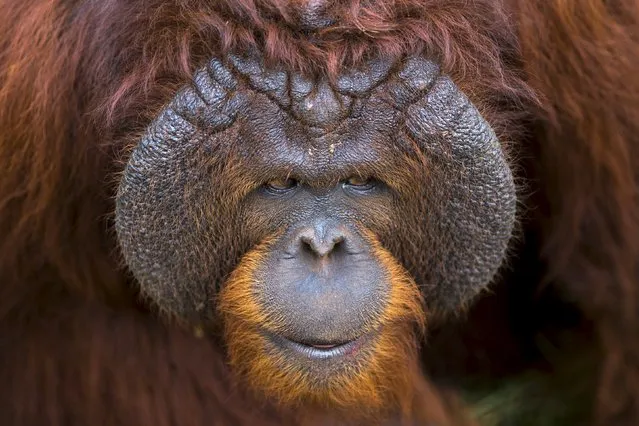
An orangutan looks on from inside its enclosure at Kao Pratubchang Conservation Centre in Ratchaburi, Thailand, August 27, 2015. Thai veterinarians from the Department of National Park Wildlife, and Plant Conservation conducted a health check of 14 orangutans for preparation for the repatriation to their country of origin, Indonesia. Most of Sumatran and Borneo Kalimantan orangutans, were confiscated from entertainment businesses in Phuket province since 2008. Authorities said the orangutans are being examined to ensure they are free from diseases such as Rabies, Foot and Mouth disease, Tuberculosis, Hepatitis and Herpes. Thai officials said the orangutans are expected to return to Indonesia in September. (Photo by Athit Perawongmetha/Reuters)
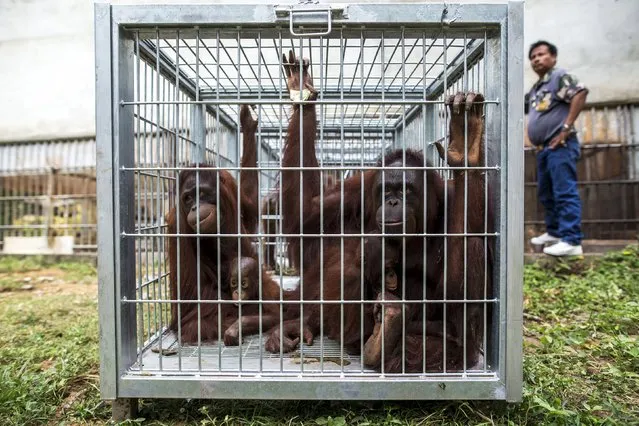
A wildlife officer stands next to orangutans in a cage before a health examination at Kao Pratubchang Conservation Centre in Ratchaburi, Thailand, August 27, 2015. (Photo by Athit Perawongmetha/Reuters)
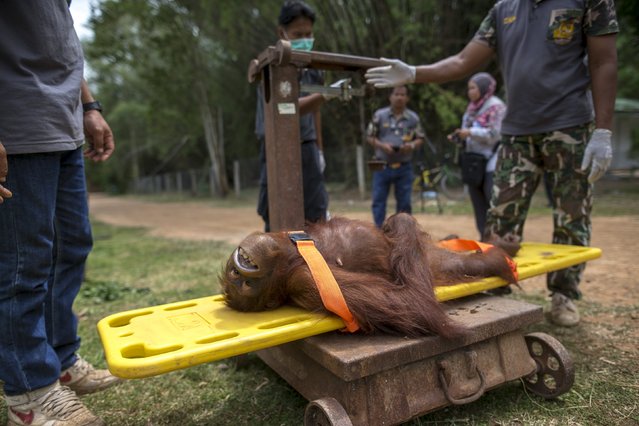
Wildlife officers measure an orangutan's weight during a health examination at Kao Pratubchang Conservation Centre in Ratchaburi, Thailand, August 27, 2015. (Photo by Athit Perawongmetha/Reuters)
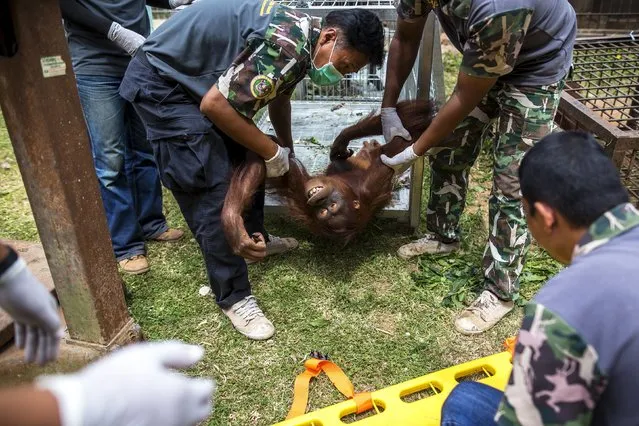
Wildlife officers carry an orangutan after an injection of anesthesia during a health examination at Kao Pratubchang Conservation Centre in Ratchaburi, Thailand, August 27, 2015. (Photo by Athit Perawongmetha/Reuters)
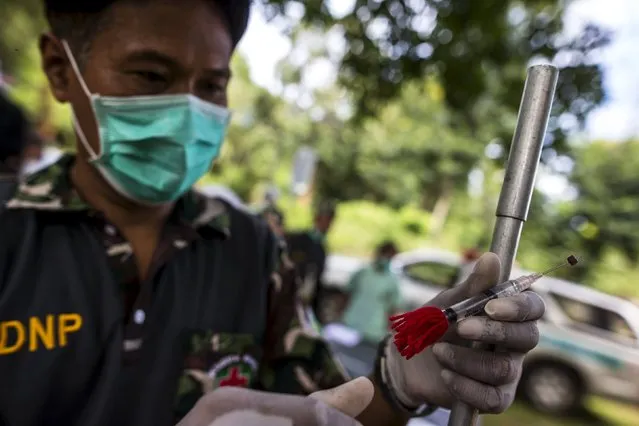
A wildlife officer prepares an anesthesia to inject on orangutans before a health examination at Kao Pratubchang Conservation Centre in Ratchaburi, Thailand, August 27, 2015. (Photo by Athit Perawongmetha/Reuters)
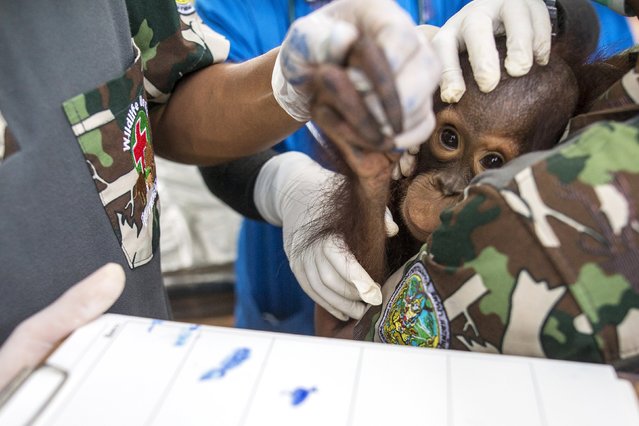
Thai veterinarians collect finger prints of 2-years-old orangutan during a health examination at Kao Pratubchang Conservation Centre in Ratchaburi, Thailand, August 27, 2015. (Photo by Athit Perawongmetha/Reuters)
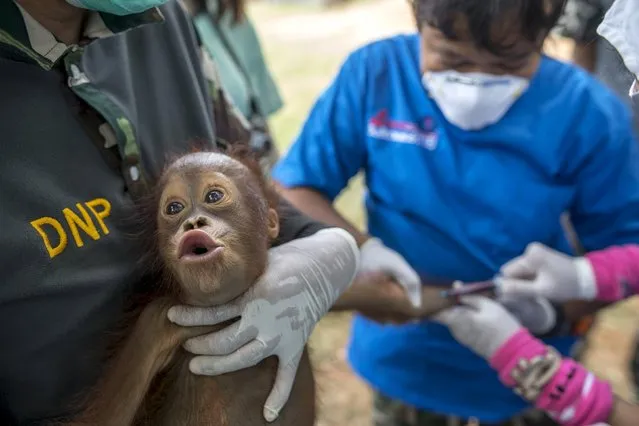
A two-year-old orangutan reacts as Thai veterinarians collect blood sample during a health examination at Kao Pratubchang Conservation Centre in Ratchaburi, Thailand, August 27, 2015. (Photo by Athit Perawongmetha/Reuters)
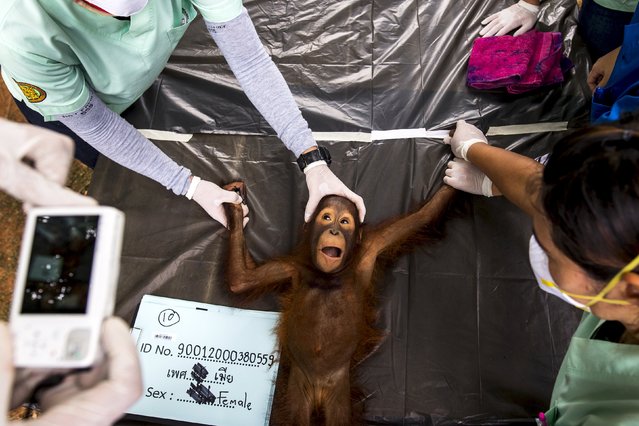
A Thai veterinarian takes a picture of a 2-year-old orangutan during a health examination at Kao Pratubchang Conservation Centre in Ratchaburi, Thailand, August 27, 2015. (Photo by Athit Perawongmetha/Reuters)
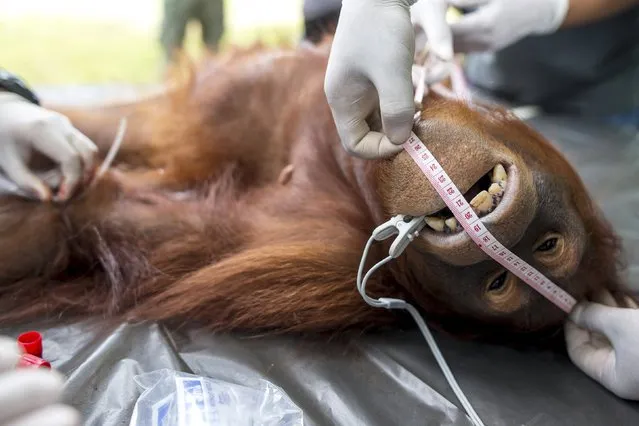
An orangutan has its skull measured during a health examination at Kao Pratubchang Conservation Centre in Ratchaburi, Thailand, August 27, 2015. (Photo by Athit Perawongmetha/Reuters)
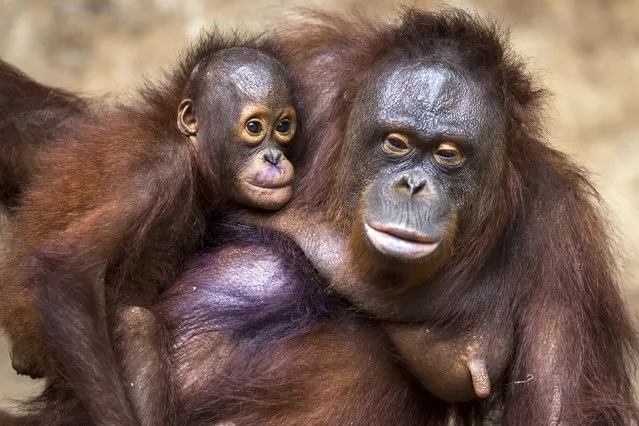
A two-year-old orangutan hugs its mother who is recovering after a health examination at Kao Pratubchang Conservation Centre in Ratchaburi, Thailand, August 27, 2015. (Photo by Athit Perawongmetha/Reuters)
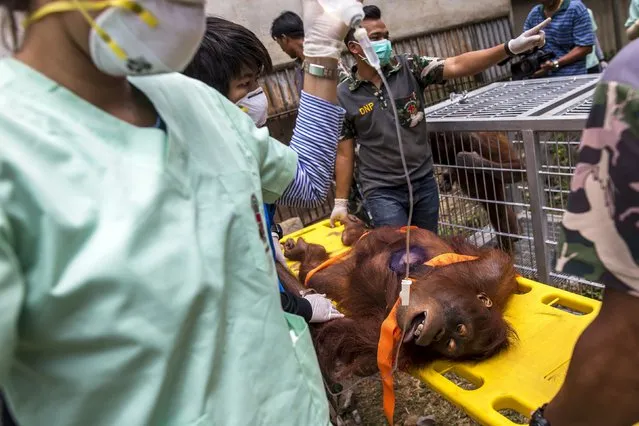
An orangutan is carried on a stretcher by Thai veterinarians and wildlife officers to a cage after a health examination at Kao Pratubchang Conservation Centre in Ratchaburi, Thailand, August 27, 2015. (Photo by Athit Perawongmetha/Reuters)
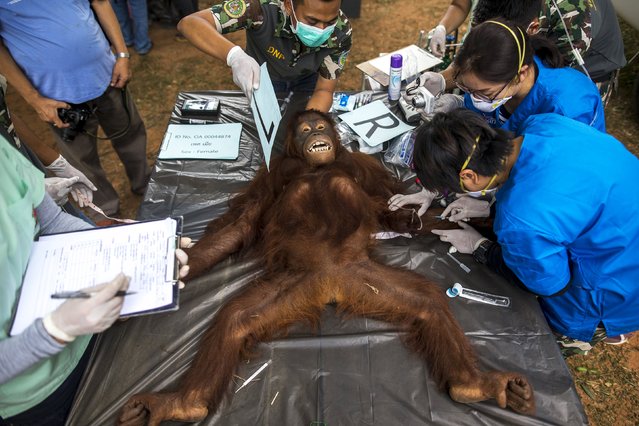
Thai veterinarians and wildlife officers collect blood sample during a health examination at Kao Pratubchang Conservation Centre in Ratchaburi, Thailand, August 27, 2015. (Photo by Athit Perawongmetha/Reuters)
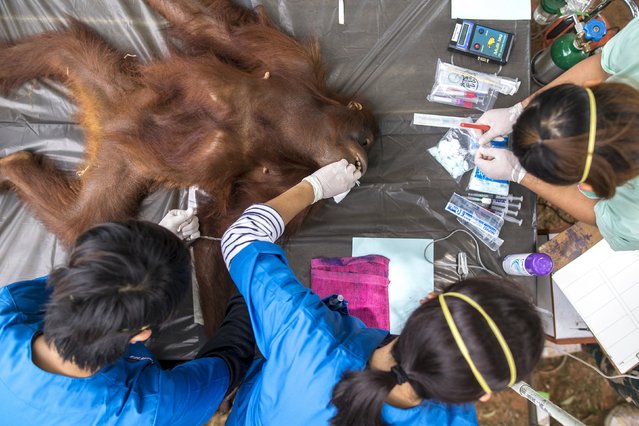
Thai veterinarians collect blood sample from an orangutan during a health examination at Kao Pratubchang Conservation Centre in Ratchaburi, Thailand, August 27, 2015. (Photo by Athit Perawongmetha/Reuters)
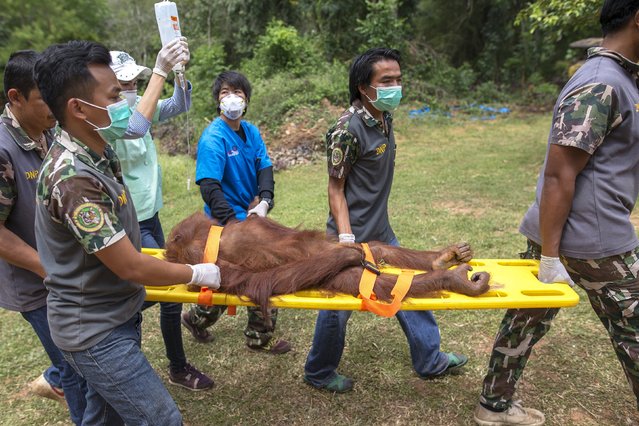
An orangutan is carried on a stretcher by Thai veterinarians and wildlife officers to a cage after a health examination at Kao Pratubchang Conservation Centre in Ratchaburi, Thailand, August 27, 2015. (Photo by Athit Perawongmetha/Reuters)
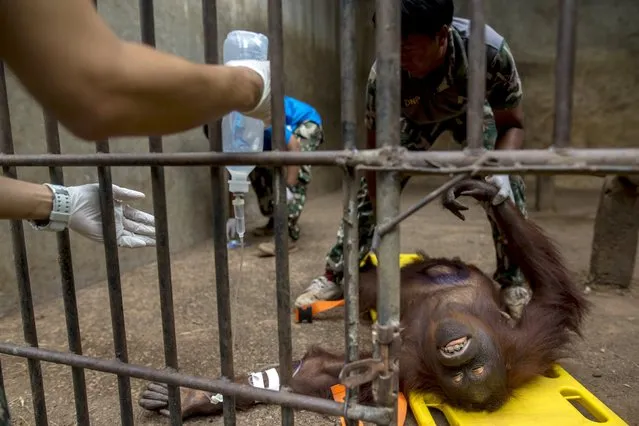
An orangutan is carried on a stretcher by Thai veterinarians and wildlife officers to a cage after a health examination at Kao Pratubchang Conservation Centre in Ratchaburi, Thailand, August 27, 2015. (Photo by Athit Perawongmetha/Reuters)
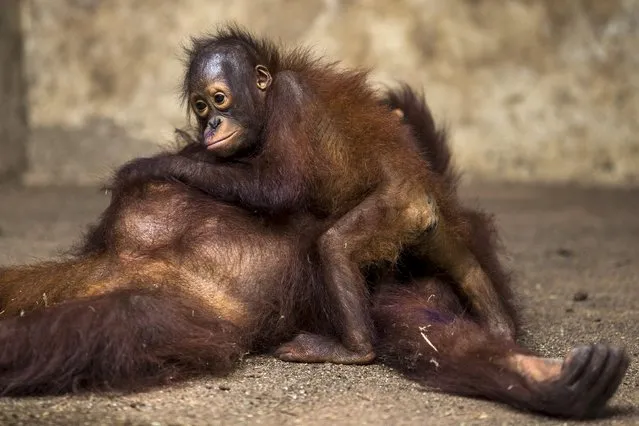
A two-year-old orangutan hugs its mother who is recovering after a health examination at Kao Pratubchang Conservation Centre in Ratchaburi, Thailand, August 27, 2015. (Photo by Athit Perawongmetha/Reuters)
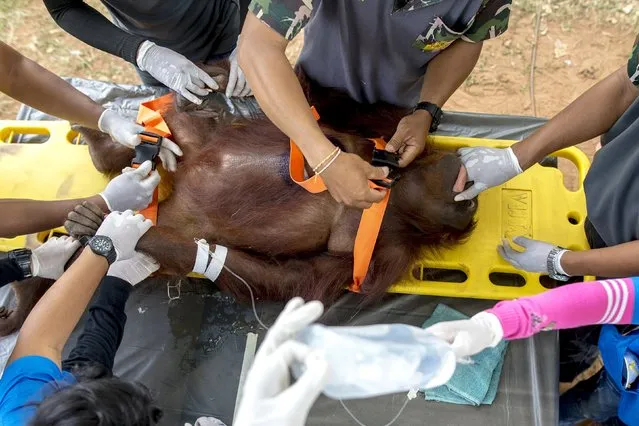
Thai veterinarians and wildlife officers move an orangutan onto a stretcher during a health examination at Kao Pratubchang Conservation Centre in Ratchaburi, Thailand, August 27, 2015. (Photo by Athit Perawongmetha/Reuters)
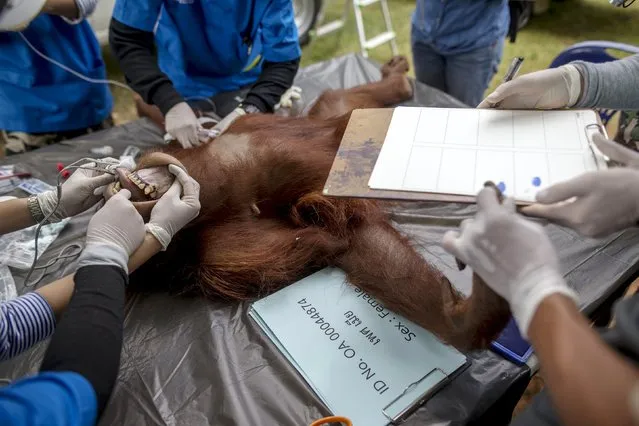
Thai veterinarians collect the fingerprints of an orangutan during a health examination at Kao Pratubchang Conservation Centre in Ratchaburi, Thailand, August 27, 2015. (Photo by Athit Perawongmetha/Reuters)
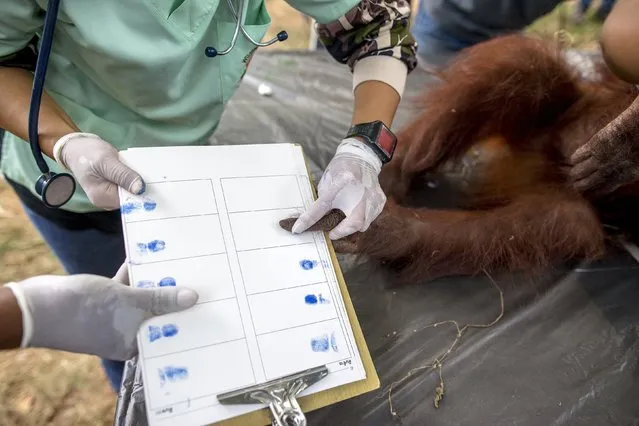
Thai veterinarians collect the fingerprints of an orangutan during a health examination at Kao Pratubchang Conservation Centre in Ratchaburi Thailand, August 27, 2015. (Photo by Athit Perawongmetha/Reuters)
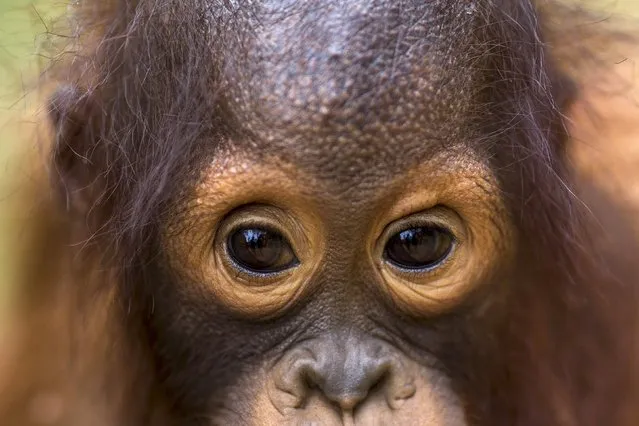
A two-year-old orangutan looks on as vets draw blood samples from him at Kao Pratubchang Conservation Centre in Ratchaburi, Thailand, August 27, 2015. (Photo by Athit Perawongmetha/Reuters)
28 Aug 2015 11:58:00,
post received
0 comments
